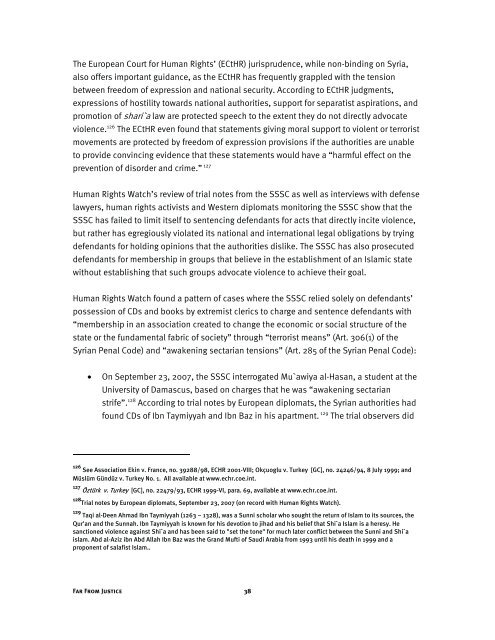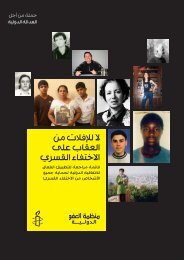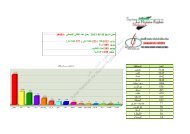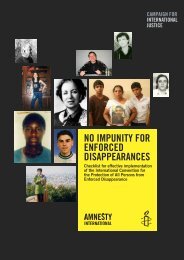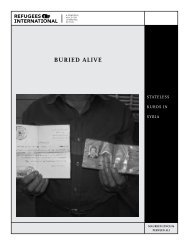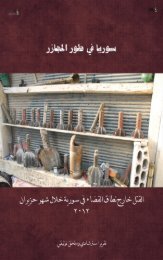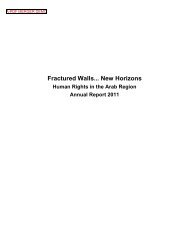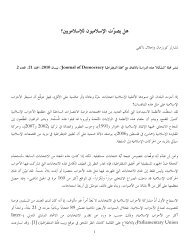Far From Justice - Human Rights Watch
Far From Justice - Human Rights Watch
Far From Justice - Human Rights Watch
- No tags were found...
You also want an ePaper? Increase the reach of your titles
YUMPU automatically turns print PDFs into web optimized ePapers that Google loves.
The European Court for <strong>Human</strong> <strong>Rights</strong>’ (ECtHR) jurisprudence, while non-binding on Syria,also offers important guidance, as the ECtHR has frequently grappled with the tensionbetween freedom of expression and national security. According to ECtHR judgments,expressions of hostility towards national authorities, support for separatist aspirations, andpromotion of shari`a law are protected speech to the extent they do not directly advocateviolence. 126 The ECtHR even found that statements giving moral support to violent or terroristmovements are protected by freedom of expression provisions if the authorities are unableto provide convincing evidence that these statements would have a “harmful effect on theprevention of disorder and crime.” 127<strong>Human</strong> <strong>Rights</strong> <strong>Watch</strong>’s review of trial notes from the SSSC as well as interviews with defenselawyers, human rights activists and Western diplomats monitoring the SSSC show that theSSSC has failed to limit itself to sentencing defendants for acts that directly incite violence,but rather has egregiously violated its national and international legal obligations by tryingdefendants for holding opinions that the authorities dislike. The SSSC has also prosecuteddefendants for membership in groups that believe in the establishment of an Islamic statewithout establishing that such groups advocate violence to achieve their goal.<strong>Human</strong> <strong>Rights</strong> <strong>Watch</strong> found a pattern of cases where the SSSC relied solely on defendants’possession of CDs and books by extremist clerics to charge and sentence defendants with“membership in an association created to change the economic or social structure of thestate or the fundamental fabric of society” through “terrorist means” (Art. 306(1) of theSyrian Penal Code) and “awakening sectarian tensions” (Art. 285 of the Syrian Penal Code):• On September 23, 2007, the SSSC interrogated Mu`awiya al-Hasan, a student at theUniversity of Damascus, based on charges that he was “awakening sectarianstrife”. 128 According to trial notes by European diplomats, the Syrian authorities hadfound CDs of Ibn Taymiyyah and Ibn Baz in his apartment. 129 The trial observers did126 See Association Ekin v. France, no. 39288/98, ECHR 2001-VIII; Okçuoglu v. Turkey [GC], no. 24246/94, 8 July 1999; andMüslüm Gündüz v. Turkey No. 1. All available at www.echr.coe.int.127 Öztürk v. Turkey [GC], no. 22479/93, ECHR 1999-VI, para. 69, available at www.echr.coe.int.128 Trial notes by European diplomats, September 23, 2007 (on record with <strong>Human</strong> <strong>Rights</strong> <strong>Watch</strong>).129 Taqi al-Deen Ahmad Ibn Taymiyyah (1263 – 1328), was a Sunni scholar who sought the return of Islam to its sources, theQur'an and the Sunnah. Ibn Taymiyyah is known for his devotion to jihad and his belief that Shi`a Islam is a heresy. Hesanctioned violence against Shi`a and has been said to "set the tone" for much later conflict between the Sunni and Shi`aislam. Abd al-Aziz ibn Abd Allah Ibn Baz was the Grand Mufti of Saudi Arabia from 1993 until his death in 1999 and aproponent of salafist Islam..<strong>Far</strong> <strong>From</strong> <strong>Justice</strong> 38


